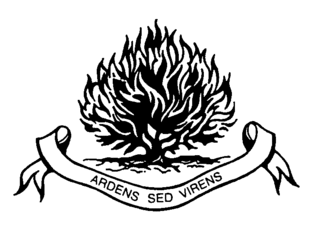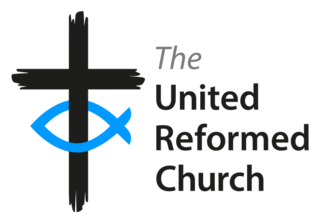
Throughout the majority of Christian history, most Christian theologians and denominations have considered homosexual behavior as immoral or sinful. Today, within Christianity, there are a variety of views on sexual orientation and homosexuality. Even within a denomination, individuals and groups may hold different views, and not all members of a denomination necessarily support their church's views on homosexuality. The Catholic Church and Orthodox churches officially condemn homosexual activity as sin. Various Mainline Protestant denominations have taken a supportive stance towards blessing homosexual clergy and same-sex marriage while others have not.

Presbyterianism is a part of the Reformed tradition within Protestantism that broke from the Roman Catholic Church. Presbyterian churches derive their name from the presbyterian form of church government by representative assemblies of elders. Many Reformed churches are organised this way, but the word Presbyterian, when capitalized, is often applied to churches that trace their roots to the Church of Scotland or to English Dissenter groups that formed during the English Civil War.

The Church of Scotland is the national church in Scotland.

The United Reformed Church (URC) is a Protestant Christian church in the United Kingdom. As of 2022 it has approximately 40,000 members in 1,284 congregations with 334 stipendiary ministers.

Since the 1990s, the Anglican Communion has struggled with controversy regarding homosexuality in the church. In 1998, the 13th Lambeth Conference of Anglican bishops passed a resolution "rejecting homosexual practice as incompatible with Scripture". However, this is not legally binding. "Like all Lambeth Conference resolutions, it is not legally binding on all provinces of the Communion, including the Church of England, though it commends an essential and persuasive view of the attitude of the Communion." "Anglican national churches in Brazil, South Africa, South India, New Zealand and Canada have taken steps toward approving and celebrating same-sex relationships amid strong resistance among other national churches within the 80 million-member global body. The Episcopal Church in the U.S. has allowed same-sex marriage since 2015, and the Scottish Episcopal Church has allowed same-sex marriage since 2017." "Church of England clergy have appeared to signal support for gay marriage after they rejected a bishops' report which said that only a man and woman could marry in church." At General Synod in 2019, the Church of England announced that same-gender couples may remain recognised as married after one spouse experiences a gender transition. In 2023, the Church of England announced that it would authorise "prayers of thanksgiving, dedication and for God's blessing for same-sex couples."
The Confessing Movement is a largely lay-led theologically conservative Christian movement that opposes the influence of theological liberalism and theological progressivism currently within several mainline Protestant denominations and seeks to return them to its view of orthodox doctrine, or form a new denomination and disfellowship (excommunicate) them if the situation becomes untenable. Those who eventually deem dealing with theological liberalism and theological progressivism within their churches and denominations as not being tenable anymore would later join or start Confessional Churches and/or Evangelical Churches that continue with the traditions of their respective denominations and maintaining orthodox doctrine while being ecclesiastically separate from the Mainline Protestant denominations.

The Church of South India (CSI) is a united Protestant Church in India. It is the result of union of a number of Protestant denominations in South India that occurred after the independence of India.
The blessing or wedding of same-sex marriages and same-sex unions is an issue about which leaders of Christian churches are in ongoing disagreement. Traditionally, Christianity teaches that homosexual acts are sinful and that holy matrimony can only exist between two persons of the opposite sex. These disagreements are primarily centered on the interpretation of various scripture passages related to homosexuality, sacred tradition, and in some churches on varying understandings of homosexuality in terms of psychology, genetics and other scientific data. While various church bodies have widely varying practices and teachings, individual Christians of every major tradition are involved in practical (orthopraxy) discussions about how to respond to the issue.

The Free Presbyterian Church of Ulster is a Calvinist denomination founded by Ian Paisley in 1951. Doctrinally, the church describes itself as fundamentalist, evangelical, and separatist, and is part of the reformed fundamentalist movement. Most of its members live in Northern Ireland, where the church is headquartered, and in County Donegal. The church has additional congregations in the Republic of Ireland, Great Britain and Australia, and a sister denomination in North America, the Free Presbyterian Church of North America, which has congregations in Canada and the United States. It also has a sister denomination in Nepal which was formed from the Nepal mission to the Unreached in November 2013.
OneBodyOneFaith, formerly the Lesbian and Gay Christian Movement (LGCM), describes itself as "UK-based international Charity which challenges homophobia and transphobia, especially within the Church and faith based organisations".

As of the 2011 census, Christianity was the largest religion in Scotland, chosen by 53.8% of the Scottish population identifying when asked: "What religion, religious denomination or body do you belong to?" This represented a decline from the 2001 figure of 65.1%.
Attitudes in Presbyterianism toward homosexuality vary, ranging from outright condemnation to complete acceptance. The World Communion of Reformed Churches has not taken a position on the issue of homosexuality.
Forward Together is an evangelical organisation within the Church of Scotland which acts as a pressure group on a variety of issues. It was founded in 1994 and currently represents 600 ministers and members of the Church of Scotland.
The Global Fellowship of Confessing Anglicans is a global network of conservative Anglican churches that formed in 2008 in response to ongoing theological disputes in the worldwide Anglican Communion. Conservative Anglicans met in 2008 at the Global Anglican Future Conference, creating the Jerusalem Declaration and establishing the Fellowship of Confessing Anglicans (FCA), which was rebranded as GAFCON in 2017.
Scott Martin Rennie is a Scottish clergyman who is the Minister of Crown Court Church of Scotland, London. He was formerly Minister of Queen's Cross Church, Aberdeen (2009-2022) and Brechin Cathedral in the Church of Scotland (1999–2009).
The ordination of lesbian, gay, bisexual and/or transgender (LGBT) clergy who are open about their sexuality or gender identity; are sexually active if lesbian, gay, or bisexual; or are in committed same-sex relationships is a debated practice within some contemporary Christian denominations.
Nceba Bethlehem Nopece is a South African Anglican bishop. He was the bishop of Port Elizabeth in the Anglican Church of Southern Africa from 2001 to 2018. He is a theological conservative, the leading name of the Anglican realignment in his church and also the chairman of the Fellowship of Confessing Anglicans in South Africa, launched in 2009.

The Presbyterian Church in Ireland is the largest Presbyterian denomination in the Republic of Ireland, and the largest Protestant denomination in Northern Ireland. Like most Christian churches in Ireland, it is organised on an all-island basis, in both Northern Ireland and the Republic of Ireland. The church has approximately 210,000 members.








